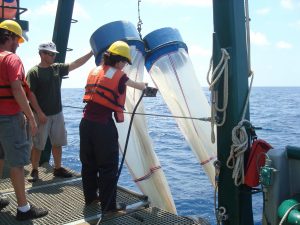***********************
– December 12, 2012
Share

Scientists studying the impacts of the Deepwater Horizon oil spill on the food web published their recent findings in the November 2012 Environmental Research Letters: Radiocarbon evidence that carbon from the Deepwater Horizon spill entered the planktonic food web of the Gulf of Mexico.
The study reports that the distinct radiocarbon isotopic composition of Macondo oil provided a sensitive tracer to estimate petro-carbon contributions from the Deepwater Horizon spill to the planktonic food web. Researchers measured carbon values in plankton collected from areas about 100 km north of the spill site and analyzed surface waters from coastal and offshore sites for dissolved inorganic carbon. Scientists used the Woods Hole National Ocean Sciences Accelerator Mass Spectrometer and the Florida State National High Magnetic Field Laboratory to analyze samples.
Their results supported the hypothesis that carbon from the Deepwater Horizon spill contributed to the offshore planktonic food web and also inferred that methane input may be important. Additionally, their results support the findings of an earlier study by Graham et al (2010 Environmental Research Letters 5 045301).
The study authors are Drs. J.P. Chanton at Florida State University (FSU), J. Cherrier at Florida A&M University (FAMU), R.M. Wilson at FSU, J. Sarkodee-Adoo at FAMU, S. Bosman at FSU, A. Mickle at FSU, and W.M. Graham at Dauphin Island Sea Lab and the University of Southern Mississippi.
This research was made possible by grants from BP/The Gulf of Mexico Research Initiative through the Florida Institute of Oceanography, the Northern Gulf Institute, the Deep-C Consortium, and the ECOGIG consortium. The GoMRI is a 10-year, $500 million independent research program established by an agreement between BP and the Gulf of Mexico Alliance to study the effects of the Deepwater Horizon incident and the potential associated impact of this and similar incidents on the environment and public health.

(Click to enlarge) Samantha Bosman, a technician with the FSU Coastal & Marine Lab, prepares to deploy bongo nets to collect plankton. RV Weatherbird II (Photo credit: Jeff Chanton, FSU)
Scientists studying the impacts of the Deepwater Horizon oil spill on the food web published their recent findings in the November 2012 Environmental Research Letters: Radiocarbon evidence that carbon from the Deepwater Horizon spill entered the planktonic food web of the Gulf of Mexico.
The study reports that the distinct radiocarbon isotopic composition of Macondo oil provided a sensitive tracer to estimate petro-carbon contributions from the Deepwater Horizon spill to the planktonic food web. Researchers measured carbon values in plankton collected from areas about 100 km north of the spill site and analyzed surface waters from coastal and offshore sites for dissolved inorganic carbon. Scientists used the Woods Hole National Ocean Sciences Accelerator Mass Spectrometer and the Florida State National High Magnetic Field Laboratory to analyze samples.
Their results supported the hypothesis that carbon from the Deepwater Horizon spill contributed to the offshore planktonic food web and also inferred that methane input may be important. Additionally, their results support the findings of an earlier study by Graham et al (2010 Environmental Research Letters 5 045301).
The study authors are Drs. J.P. Chanton at Florida State University (FSU), J. Cherrier at Florida A&M University (FAMU), R.M. Wilson at FSU, J. Sarkodee-Adoo at FAMU, S. Bosman at FSU, A. Mickle at FSU, and W.M. Graham at Dauphin Island Sea Lab and the University of Southern Mississippi.
This research was made possible by grants from BP/The Gulf of Mexico Research Initiative through the Florida Institute of Oceanography, the Northern Gulf Institute, the Deep-C Consortium, and the ECOGIG consortium. The GoMRI is a 10-year, $500 million independent research program established by an agreement between BP and the Gulf of Mexico Alliance to study the effects of the Deepwater Horizon incident and the potential associated impact of this and similar incidents on the environment and public health.

No comments:
Post a Comment